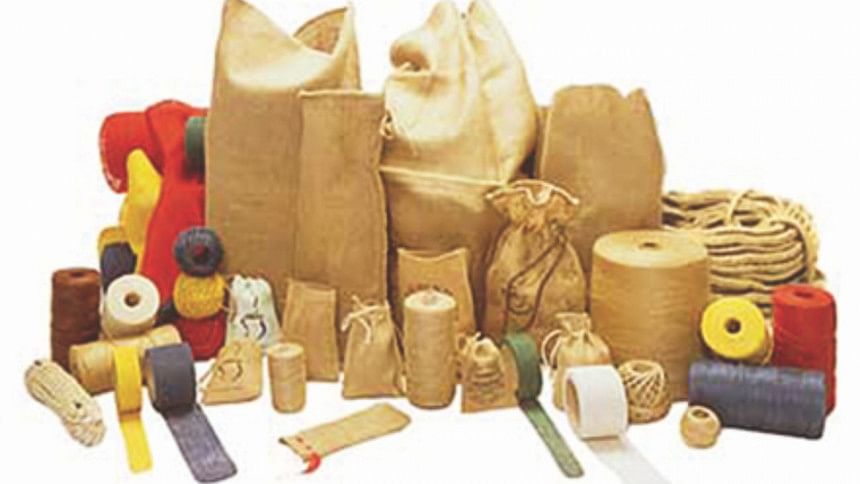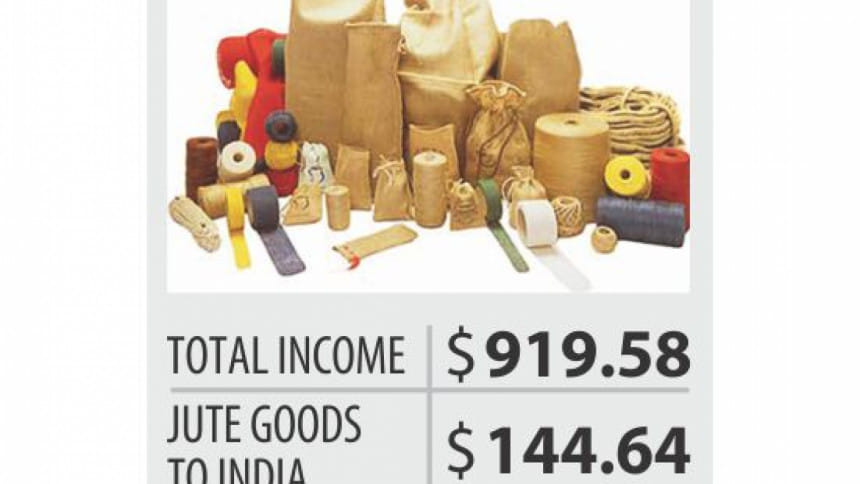Dhaka to engage with Delhi to lift jute duty

With a fifth of the country's yearly jute exports at stake following India's imposition of anti-dumping duty on import of jute products from Bangladesh and Nepal, a national jute advisory committee meeting yesterday decided to engage immediately with India for lifting the duty.
The meeting, held at the textiles and jute ministry, also decided that the duty issuance would be discussed during prime minister's upcoming visit to India.
A number of stakeholders, who participated in the meeting, held with Minister of Textiles and Jute Md Emaj Uddin Pramanique in the chair, told The Daily Star that Bangladesh would use “diplomatic and political” means first before going for any legal recourse involving the World Trade Organization (WTO).
Since the January 5 imposition of the anti-dumping duty ranging from $6.30 to $351.72 per tonne, jute products worth over $12 million under shipment to India got stuck in the ports, market sources said.
Of the total $919 million worth of jute and jute goods Bangladesh exported in the last financial year (2015-16), over $260 million of the same were sent to India.
Of that total, $96.68 million was raw jute, $86.93 million jute yarn and twine and $57.71 million jute sacks and bags.

Industry sources said the Indian move, came as part of its protection mechanism to cushion its local jute industry from regional competition, would have no implication on raw jute import from Bangladesh. But it already started to have a negative impact on the import of jute goods from Bangladesh.
"Tk 100 crore jute goods, meant for immediate exports to India, have been placed on hold in the ports and warehouses following last week's imposition of anti-dumping duty," Rashedul Karim Munna, convener of Bangladesh Jute Diversified Products Manufacturers and Exporters Association, told The Daily Star yesterday.
Najmul Huq, managing director of one the country's oldest jute mill – Janata Jute Mills Ltd, feared that many small jute units, which cater to yarn and sacks industries in the Indian market, are badly affected.
He said export worth around $150 million is at stake now and the government should have engaged beforehand as talks of imposition of anti-dumping duty was looming in India for quite some time.
Barik Khan, secretary of Bangladesh Jute Mills Association (BJMA), said "as the ministers [Jute Minister Md Emaj Uddin Pramanique and state minister Mirza Azam] today [yesterday] assured us that the prime minister would take up the jute issue with India during her upcoming visit, we sought an urgent solution of the problem."
There were also proposals to impose anti-dumping duty on cheaper Indian clothes being imported in Bangladesh, said Khan.
"As our exporters' goods got stranded at land ports, the Indian importers are now proposing to bear the anti-dumping duty sharing 50:50. But many of the jute goods' exporters would not be able to make any profit out of these exports from such deals," said Shahidul Karim, secretary general of Bangladesh Jute Spinners Association (BJSA).
Based on complaints from Indian stakeholders, the Directorate General of Anti-Dumping and Allied Duties (DGAD), India had initiated a probe into imports of the products in 2015. After its probing, the DGAD drew a conclusion that there is "dumping of goods" and the imports were "undercutting and suppressing the prices of the domestic industry".
The import restrictive levy, imposed for five years, would cover imports of jute yarn/twine, hessian fabric and jute sacks in "all forms and specifications".
Nepalese daily The Katmandu Post quoted the Himalayan country's Jute Industry Association President Raj Kumar Golchha as saying, “India's move has put the already struggling Nepali jute industry on the verge of collapse”.
Nepalese jute producers import 70 percent of raw materials from India and export finished products to its southern neighbour. Nearly 95 percent of Nepalese jute produces are exported to India.
In response to the adverse impact that Bangladesh's jute industry would face due to the anti-dumping duty, State Minister for Textiles and Jute Mirza Azam said on Tuesday that prime minister's upcoming India visit would help reversing the Indian duty decision.
Besides, he indicated that the government would explore new markets beyond India for Bangladesh's jute products.
Convener of Bangladesh Jute Diversified Products Manufacturers and Exporters Association, Rashedul Karim Munna, told The Daily Star yesterday that the government is also contemplating including at least 11 more items under mandatory jute packaging in addition to six essential products -- paddy, rice, wheat, maize, fertiliser and sugar -- so that more gunnysacks are locally used.
Rashedul Karim Munna, also managing director of Creation Private Limited that produces products using jute fibre, told The Daily Star that currently Bangladesh is exporting over 1.5 million tonnes of yarn to India and 40,000 tonnes of hessian fabric, twine and jute sacks and bags.
Following the imposition of anti-dumping duty, the Dhaka Chamber of Commerce and Industries (DCCI) said Indian market accounts for 20 percent of Bangladesh's jute goods exports, which is equivalent to only 8 percent of entire Indian local market share and "this insignificant percentage can't in anyway dump their local jute market."
DCCI argued that there is no clear finding of detriment to Indian finished jute product industry caused by price and volume of jute products exported from Bangladesh.
DCCI urged the Ministry of Commerce, Ministry of Finance, Tariff Commission and other agencies concerned of Bangladesh to immediately take up the issue to reverse the decision of anti dumping duty imposition.
Industry sources said, lodging complains with the WTO remains an option for Bangladesh, only if “diplomatic and political” moves do not yield results.
They recalled that when the Indian government imposed anti-dumping duty on lead acid batteries from all Bangladeshi exporters on January 2, 2002, Bangladesh government's petition to the WTO prompted New Delhi to consider withdrawing the duty.
Bangladesh government placed the case before the WTO and a consultation was held on February 26-27, 2004 and after certain procedures the Indian authorities lifted the duty eventually in early 2005.

 For all latest news, follow The Daily Star's Google News channel.
For all latest news, follow The Daily Star's Google News channel. 



Comments